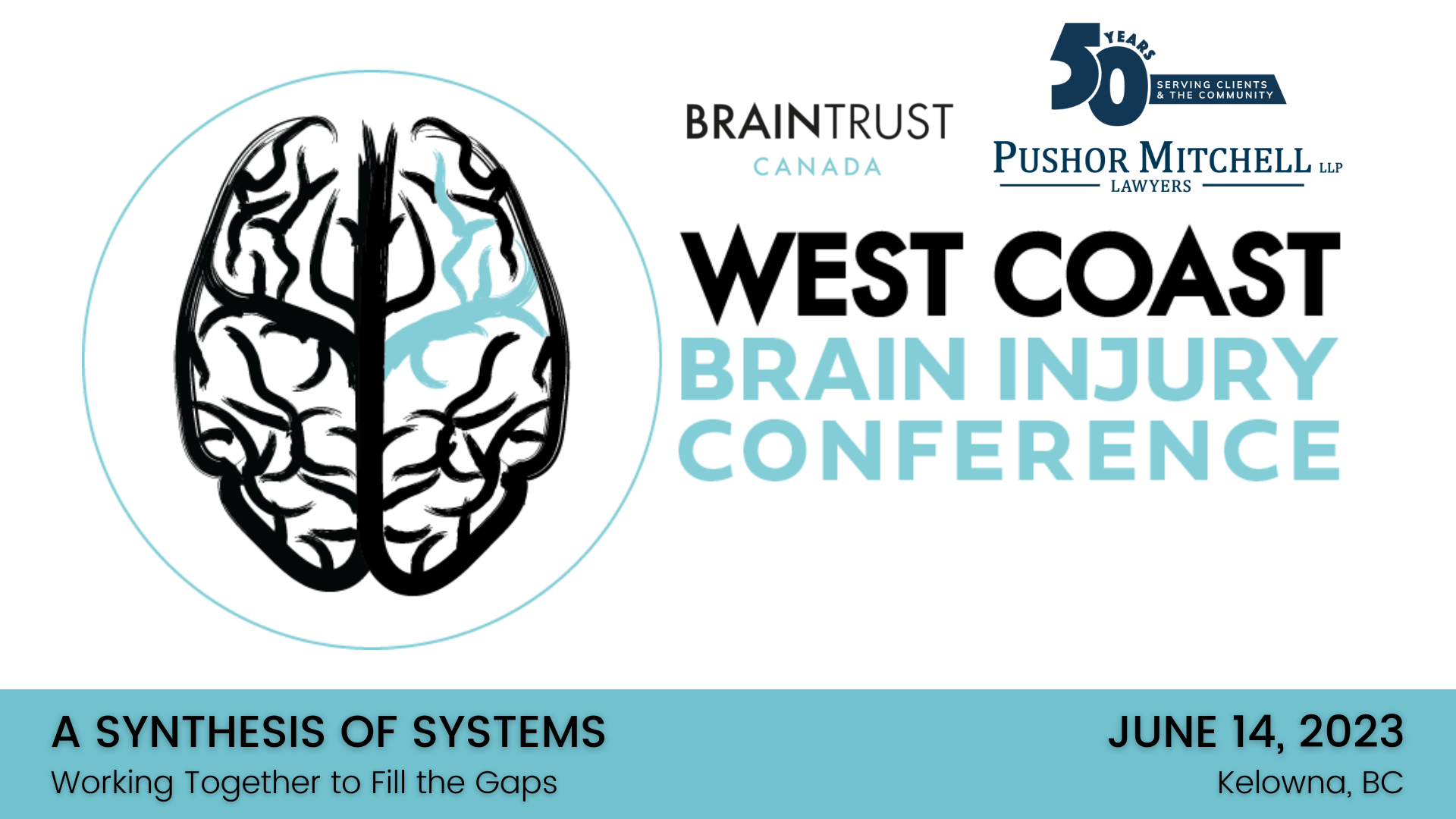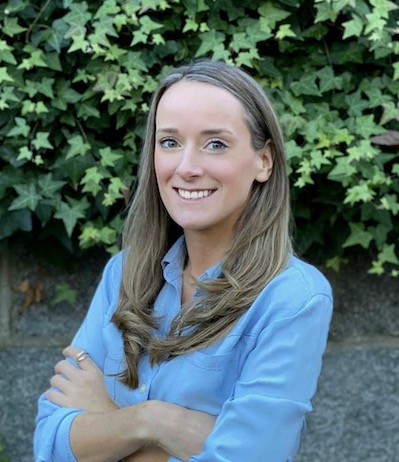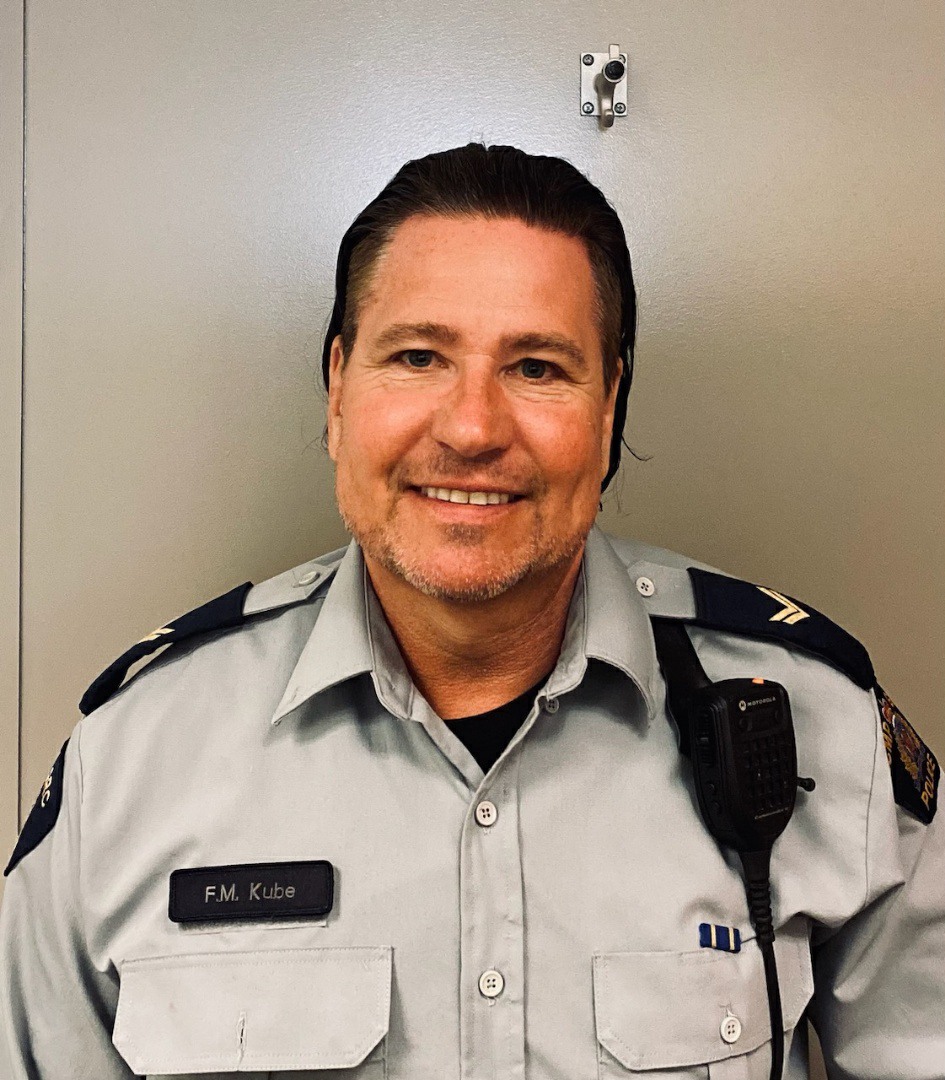
A Little Goes A Long Way
Your gift today is an investment in BrainTrust services that improve the lives of those with brain injury.
Donate TodayFebruary 8, 2023


Pushor Mitchell LLP West Coast Brain Injury Conference
The Pushor Mitchell LLP West Coast Brain Injury Conference (WCBIC) 2023 will bring together inspiring change-makers and leading minds in the field of brain injury, public health, and politics for a full day of collaboration, dialogue, and learning.
In line with this year’s conference theme, “A Synthesis of Systems: Working Together to Fill the Gaps”, our focus is on the brain and behaviour in the context of current social issues, community connection, and systems change. Speakers topics will include intersectionality and disability justice, harm reduction, misdiagnosis of brain injury, and the perspectives of those with lived experience of brain injury.
As an attendee, sponsor, or exhibitor, you will be joining us on our mission to harness the power of community and collaboration to uplift individuals living with brain injury who fall through the gaps in our systems.
We hope that you will join us for this very important and innovative community event. Together, we believe we can make our community more just, kind, and equitable for all.
Responding to the Overdose Crisis in British Columbia: Opportunities and Challenges
Dr. Mary Clare Kennedy
British Columbia is contending with an escalating epidemic of overdose deaths driven by a toxic drug supply. Although a public health emergency was declared in 2016 in response to this crisis, overdose deaths have continued to increase, and the morbidity associated with non-fatal overdose pose a range of new challenges. This presentation will review the latest epidemiology specific to the overdose crisis, and will highlight the role of emerging substances, including illicitly-manufactured synthetic drugs. A range of interventional and policy approaches will be discussed, including those spanning the prevention, harm reduction, treatment, and enforcement pillars. Also discussed will be the role of ongoing healthcare provider education and clinical guideline development as key components to the response to the overdose emergency.
Identifying and filling gaps in treatment for people in the chronic stages of brain injury
Dr. Robin Green
This presentation will discuss clinical diagnosis of brain injury as a gateway to services, including barriers to obtaining a clinical diagnosis and the importance of self-advocacy. The dangers and implications of missed diagnoses for people with brain injury and comorbid mental health and substance use issues will be explored. This presentation will also highlight recent work on telerehabilitation research and models.
From Surviving to Thriving: Building Better Habits for Brain Health
Corbin Coulter
In my talk, I will discuss how sustaining a severe traumatic brain injury as a young adult changed my life, including my mental health, and how I came to focus on brain health. I will talk about the importance of brain health for prevention of illness and injury. As well, I will discuss the value of breathwork and mindfulness-focused interventions in my brain injury recovery.
How brain injury and other disabilities can affect spousal support and other Family Law related issues
Brent Coyne
This presentation will review what people with disability are entitled to from a legal perspective, including disability and spousal support, as well as how disability of a minor can impact child support.
Topic: Disability Justice and Ethical Responsibility
Laura Hockman
How can we make neurorehabilitation more effective?
Dr. Lara Boyd
The most difficult questions in rehabilitation are “What is this patient’s potential for recovery?” and “What is the best rehabilitation strategy for this person?” Without answers to these questions, clinicians struggle to make decisions regarding the focus of therapy, researchers design studies that mix participants who have a high likelihood of responding with those who do not, and patients suffer from suboptimal outcomes. Biomarkers are measures that can be used to categorize patient subtypes and identify who will respond to certain therapies. This talk will explain how biomarkers can be used personalize rehabilitation. Ongoing research that pairs magnetic resonance imaging with noninvasive brain stimulation will be presented as an illustration of evidence based, person centered care.
Part of the Solution: Addressing Harm Reduction and Anoxic Brain Injury as a Community
Panel Speakers: Ali Butler, Mary Clare Kennedy, Michael Kube, Mike Gawliuk, Shannon Pedlar
Local community leaders will share their perspective on harm reduction and anoxic brain injury and how this relates to systemic issues affecting our community including homelessness, crime, mental health, and community supports for individuals with complex needs. The interactive panel will discuss how we can work together as community partners to build a foundation of support and be part of the solution. Attendees will have the opportunity to ask questions to the panel of speakers.
Enhancing Organizational Awareness
Jason McIntyre
BC Corrections provides correctional services and programs to individuals 18 years and older. We are 2,647 probation officers, correctional officers and staff working together to reduce reoffending and protect communities in BC. Across the province we operate 10 correctional centres holding approximately 1700 individuals and 56 Community Corrections offices supervising around 20,000 clients. It is estimated that 60-80% of individuals in a correctional setting could have a history of brain injury. Over the last 5 years we have been working on increasing the awareness of staff and clients about the impacts of brain injury with the goal of being more responsive to the needs of these individuals in our care. This presentation will explore the ways we are bringing this knowledge and awareness to our organization, including a project with Brain Injury Canada to create a first of its kind education resource for staff in provincial correctional settings.
Brain Injury in the Justice System: Kelowna’s Integrated Court
Lisa Wyatt
Kelowna’s Integrated Court is a court for individuals whose offending is due, at least in part, to an underlying issue such as mental health, substance use, or brain injury. The court operates from the view that the most effective way to avoid or prevent offending is to assist these individuals in managing and overcoming these underlying circumstances. As a founding member of Kelowna’s Integrated Court, Judge Lisa Wyatt will explain how the court was established, the importance of community engagement, and the process by which cases are seen in the court. This interactive discussion will include a question-and-answer period.











Kelowna, BC
Address:
Rotary Centre for the Arts
421 Cawston Avenue
Kelowna, BC V1Y 6Z1
